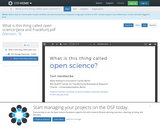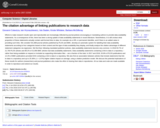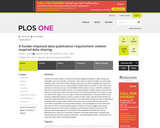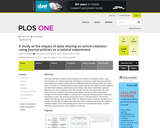
A general introduction to open scholarship.
- Subject:
- Applied Science
- Life Science
- Physical Science
- Social Science
- Material Type:
- Lesson
- Provider:
- METRICS
- Author:
- Tom Hardwicke
- Date Added:
- 01/13/2020

Open scholarship policy examples, guidance, and research. Institutional policy, funder policy, publisher policy, governmental policy, tenure policies, and more.

A general introduction to open scholarship.

Efforts to make research results open and reproducible are increasingly reflected by journal policies encouraging or mandating authors to provide data availability statements. As a consequence of this, there has been a strong uptake of data availability statements in recent literature. Nevertheless, it is still unclear what proportion of these statements actually contain well-formed links to data, for example via a URL or permanent identifier, and if there is an added value in providing them. We consider 531,889 journal articles published by PLOS and BMC which are part of the PubMed Open Access collection, categorize their data availability statements according to their content and analyze the citation advantage of different statement categories via regression. We find that, following mandated publisher policies, data availability statements have become common by now, yet statements containing a link to a repository are still just a fraction of the total. We also find that articles with these statements, in particular, can have up to 25.36% higher citation impact on average: an encouraging result for all publishers and authors who make the effort of sharing their data. All our data and code are made available in order to reproduce and extend our results.

Growth of the open science movement has drawn significant attention to data sharing and availability across the scientific community. In this study, we tested the ability to recover data collected under a particular funder-imposed requirement of public availability. We assessed overall data recovery success, tested whether characteristics of the data or data creator were indicators of recovery success, and identified hurdles to data recovery. Overall the majority of data were not recovered (26% recovery of 315 data projects), a similar result to journal-driven efforts to recover data. Field of research was the most important indicator of recovery success, but neither home agency sector nor age of data were determinants of recovery. While we did not find a relationship between recovery of data and age of data, age did predict whether we could find contact information for the grantee. The main hurdles to data recovery included those associated with communication with the researcher; loss of contact with the data creator accounted for half (50%) of unrecoverable datasets, and unavailability of contact information accounted for 35% of unrecoverable datasets. Overall, our results suggest that funding agencies and journals face similar challenges to enforcement of data requirements. We advocate that funding agencies could improve the availability of the data they fund by dedicating more resources to enforcing compliance with data requirements, providing data-sharing tools and technical support to awardees, and administering stricter consequences for those who ignore data sharing preconditions.

This study estimates the effect of data sharing on the citations of academic articles, using journal policies as a natural experiment. We begin by examining 17 high-impact journals that have adopted the requirement that data from published articles be publicly posted. We match these 17 journals to 13 journals without policy changes and find that empirical articles published just before their change in editorial policy have citation rates with no statistically significant difference from those published shortly after the shift. We then ask whether this null result stems from poor compliance with data sharing policies, and use the data sharing policy changes as instrumental variables to examine more closely two leading journals in economics and political science with relatively strong enforcement of new data policies. We find that articles that make their data available receive 97 additional citations (estimate standard error of 34). We conclude that: a) authors who share data may be rewarded eventually with additional scholarly citations, and b) data-posting policies alone do not increase the impact of articles published in a journal unless those policies are enforced.